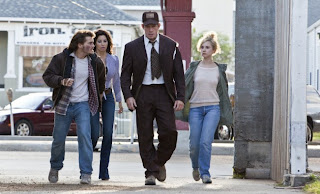No one apart from the elitist, puritan 'indie' crowd had any major problem with David Gordon Green turning to commercial comedy for his fifth feature. That film - Pineapple Express - was, despite a drastic change of gear for the director, a solid buddy-movie within the popular confines of the stoner sub-genre, and a fine example of an artist working and succeeding outside a comfort zone. Prince Avalanche is the film Green probably should have made after Express, but unfortunately the diminishing results delivered thereafter truly gave the purists a reason to fearfully complain. Choosing comedy is one thing, delivering bad comedy is to every artist's detriment.
It's a relief then that this once deemed cinematic wunderkind has returned to his true strengths, giving us another buddy movie but this time within his undeniable realm. A free-styling film packed with passion, comedy, and off-beat surrealist tinges that tells of an artist coming home.
The year is 1988 and after a devastating streak of forrest fires that destroyed thousands of homes, two highway workers head through the Texas country restoring order to the roads. Alvin (Paul Rudd) is the older, more reticent of the two whose mature demeanour is construed as pretension. His girlfriend's brother, Lance (Emile Hirsch), is the younger more reckless man who believes himself a gentleman, a ladies' man though more love rat than he has sense to see. A typical pairing in a comedy such as this, the juxtaposed personalities that jaunt and conflict to hopefully much hilarity.
The comedy certainly succeeds; Hirsch gives a tender innocence to the mostly baffooning Lance, a performance of bewilderedness as a young man who must eventually succumb to responsibility. Then there's Paul Rudd, one of the most natural performers currently working who gives his most morose and (at least in the beginning), his most distancing of characters. Rudd's delivery is always on the mark, performing like the camera isn't on him.
The two men's personas have been described quite simply but like the thousands of straight road lines painted by this duo, life and experience soon reeks havoc, descending these lines into disarray as the film becomes a symbol of hope and change among devastation. Life is never a straight line, it's messy with erratic deviations; Both men are confronted with their adult lives in some way, Lance may have to finally take the first steps toward manhood while Alvin learns to become less obtuse and regains his lost zest.
Prince Avalanche is full of touching moments, full blown comedy built on a central chemistry, and also moments of pain. In the backdrop of great natural disasters the film can be read as a parable of sorts, teaching of the human soul's resilience and capacity for change in loss. In one ghostly scene Alvin sees a lone woman among the rubble of her home looking for an important document; it's a subtly powerful moment, both beautiful and chillingly resonant as a woman looks for herself among a former life full of charred inanimate belongings.
It's no accident that this is Green's best film since possibly even All The Real Girls. His film's have always hit their mark best when as far removed from plot as possible, focussing on time, space, and emotion with an impressionistic approach often bordering on the surreal. There are moments here that would only sound and feel right in a film by Green; conversations where Alvin professes to having flown for several seconds before crashing into a rocky ravine, and Lance eerily describing how in the night he slept standing straight up.
With a sensational, heightening score from David Wingo and Explosions in the Sky, and Tim Orr's (expected) stunning cinematography that connects so wonderfully again with the off-kilter, freefalling material. Prince Avalanche is a must see work from one of America's premiere filmmakers returning to a sensibility that got everyone so stirred up with the release of his George Washington. Here is a road movie that reminds of 1970s independent cinema, of Robert Altman and Jerry Schatzberg. A journey that takes you into human experience, stirs the senses, stimulates the mind, and leaves you with a smile to fill valley with.



